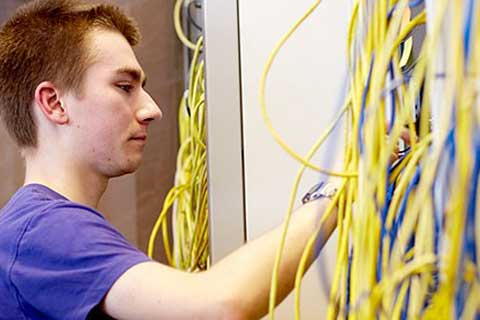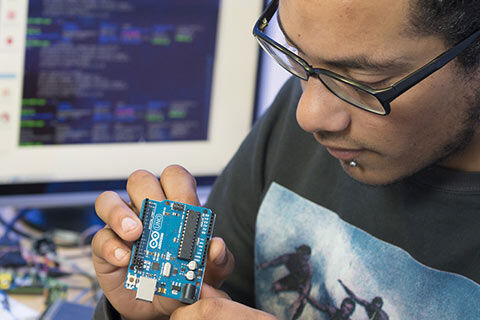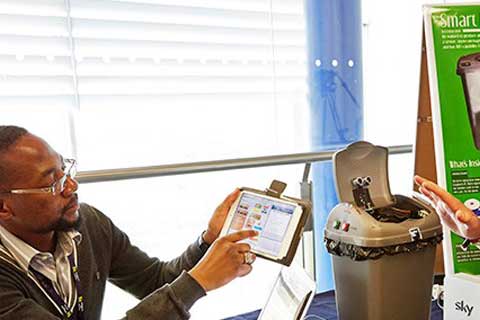
Computing Research Degrees - PhD
Currently viewing course to start in 2026/27 Entry.
We welcome enquiries relating to hardware of telecommunications, computer networks, games technology, electronic engineering and software engineering. Areas of research in which staff are currently active include gaming, e-business, home automation, learning technologies, intelligent systems, security and forensics, robotics and cloud computing....
- Level Postgraduate Research
- Study mode Full Time/Part Time/Distance Learning
- Award PhD
- Start date September 2026, February 2027, May 2027
- Subject
- Location City Centre
This course is:
Open to International Students
Overview
We welcome enquiries relating to hardware of telecommunications, computer networks, games technology, electronic engineering and software engineering. Areas of research in which staff are currently active include gaming, e-business, home automation, learning technologies, intelligent systems, security and forensics, robotics and cloud computing.
Contact Doctoral Research College (DRC) admissions for more information.

Introducing STEAMhouse
STEAMhouse is a centre for technology, innovation, creative thinking, prototyping and business development. Our £70 million pound building is the home for all of our Computing courses.
What's covered in this course?
A PhD, “Doctor of Philosophy”, is the highest-level qualification, based on individual and detailed research, resulting in a thesis of about 80,000 words.
We offer specialist supervision if you wish to pursue research programmes for the award of PhD. You may undertake your research either full-time or part-time. If you are accepted for PhD research you will be assigned to a Director of Studies (your main supervisor) and at least one second supervisor. There will be a programme of training workshops and seminars to support you.
As a research student you will exposed to a versatile range of academics. You will be encouraged to take part in various activities, seminars, to publish in collaboration with your supervisors and to take part in research conferences nationally and (where possible) internationally. The Faculty as a whole also has a growing population of research students who organise social and academic events.
Why Choose Us?
- Expert staff supervisors, keen to help their students succeed
- Encouragement and support for you to publish your work
- Opportunities to support and teach other students, including bringing your new research into their education
Research Interests
Current interests
The School welcomes enquiries relating to hardware of telecommunications, computer networks, games technology, electronic engineering and software engineering. Areas of research in which staff are currently active include gaming, e-business, home automation, learning technologies, intelligent systems, security and forensics, robotics and cloud computing.
Other interests include:
- Machine Learning
- Evolutionary Computation
- Multi-Agent Systems
- Knowledge Engineering
We find it most effective to work with inquirers to focus their research ideas before a formal application is made. You can contact either individual staff or the School's Director of Research Degrees, Dr Chris Creed.
Fees & How to Apply
UK students
Annual and modular tuition fees shown are applicable to the first year of study. The University reserves the right to increase fees for subsequent years of study in line with increases in inflation (capped at 5%) or to reflect changes in Government funding policies or changes agreed by Parliament. View fees for continuing students.
Award: PhD
Starting: Sep 2026
- Mode
- Duration
- Fees
- Full Time
- 3-4 years
-
TBC
- Part Time
- 4-7 years
-
TBC
- Distance Learning
- 4-7 years
-
TBC
Award: PhD
Starting: Feb 2027
- Mode
- Duration
- Fees
- Full Time
- 3-4 years
-
TBC
- Part Time
- 4-7 years
-
TBC
- Distance Learning
- 4-7 years
-
TBC
Award: PhD
Starting: May 2027
- Mode
- Duration
- Fees
- Full Time
- 3-4 years
-
TBC
- Part Time
- 4-7 years
-
TBC
- Distance Learning
- 4-7 years
-
TBC
International students
Annual and modular tuition fees shown are applicable to the first year of study. The University reserves the right to increase fees for subsequent years of study in line with increases in inflation (capped at 5%) or to reflect changes in Government funding policies or changes agreed by Parliament. View fees for continuing students.
Award: PhD
Starting: Sep 2026
- Mode
- Duration
- Fees
- Full Time
- 3-4 years
-
TBC
- Part Time
- 4-7 years
-
TBC
- Distance Learning
- 4-7 years
-
TBC
Award: PhD
Starting: Feb 2027
- Mode
- Duration
- Fees
- Full Time
- 3-4 years
-
TBC
- Part Time
- 4-7 years
-
TBC
- Distance Learning
- 4-7 years
-
TBC
Award: PhD
Starting: May 2027
- Mode
- Duration
- Fees
- Full Time
- 3-4 years
-
TBC
- Part Time
- 4-7 years
-
TBC
- Distance Learning
- 4-7 years
-
TBC
If you’re unable to use our online application form for any reason, please get in touch.
You must complete a research proposal and upload this as part of your application.
Entry Requirements
PhD applicants will normally be expected to hold a Master's degree in a relevant area.
You will need to complete the research degree application form and provide a statement of your initial research ideas (we advise between 1,000 and 2,000 words, with full referencing to relevant literature).
Course in Depth
Why study a PhD?
Are you keen to contribute innovative ideas to your field? Looking to solve problems, discover something new, and make a difference to society?
We have a vibrant research community here at Birmingham City University, with many talented postgraduate researchers developing and exchanging knowledge across their fields.
Conducting a PhD will allow you to develop cutting-edge research in your area of interest, with the support of your research supervisor and fellow research community.
The PhD Journey
Full-time students are expected to complete within 3-4 years, whilst part-time students may take 4-7 years. In your first year (two years for PT students) you will spend time reviewing the field, refining your research proposal and projected plan, and developing key topic-specific research skills. You will be supported in this through attendance at the Postgraduate Certificate in Research Practice, which runs for the first semester of your studies.
Your progress is reviewed every 6 months, with alternating ‘light-touch’ written reviews with your supervisors and annual reviews involving a written paper, presentation and interview with an independent panel of experienced supervisors.
Your second year (years 3 and 4 for PT students) is likely to be spent undertaking in-depth research (data collection and analysis) in your chosen area, with the third year (years 5-6 for PT students) involving writing up your results and presenting them in a suitable format (usually a written thesis of some 80,000 words).
Once you have submitted your thesis the examiners usually need 6-8 weeks to read it before the viva (oral) examination, after which there is likely to be a period for corrections / rewriting before successful completion and award of your PhD.
Throughout your studies we aim to develop your research skills, and support you in presenting your work through publication and conferences. We expect your participation in the range of research-related activities within the Faculty, contributing to building our research community. You many get opportunities to teach and support other students. We also encourage you to think of your career path and development in the longer term, as well as the first post-PhD job.
How the PhD is assessed
Your progress is reviewed every 6 months, with alternating ‘light-touch’ written reviews with your supervisors and annual reviews involving a written paper, presentation and interview with an independent panel of experienced supervisors. The annual reviews will assess whether you continue with your PhD studies, or whether lack of progress means that you should transfer to an MPhil, or withdraw from your study.
Once you have submitted your thesis the examiners usually need 6-8 weeks to read it before the viva (oral) examination. The viva commonly lasts between 1 and 3 hours and questions can be wide-ranging about your research, how it fits into your discipline, and its contribution to knowledge and impact. The examiners’ recommendation is based on a combination of the thesis and viva performance.
Following the viva there is likely to be a period for corrections / rewriting before successful completion and award of your PhD.
Employability
The value of a PhD
The Doctor of Philosophy or PhD is recognised worldwide and is often an essential requirement for those wishing to follow an academic or research career in industry or commerce.
For some jobs a PhD is virtually a necessity – in the academic world. In many professional roles it is an indicator of personal commitment, critical and creative thinking, personal management and ability to work with and even manage others, and is a step to promotion and higher-level, often managerial, roles.
After the PhD
From the very start of your PhD journey we encourage you to think about what happens after you graduate: how the PhD will contribute to your career plan from identifying and getting your first job to beyond. We use the VITAE research career development framework to help you plan for your future.
Placements
Some PhD topics may allow you the opportunity to work with other institutions and companies as part of your research. This could be as a placement, but this is rare for our PhDs – agreements to work with a company to collect data are much more common.
Occasionally, external funding or contacts have provided placement opportunities not directly related to the PhD research: while these contribute to your knowledge, skills and CV, they do interrupt your studies.
You can discuss your options with your potential supervisors, if you feel a placement would benefit your research.
Facilities & Staff
Our Facilities
We are constantly investing in our estate and are currently in the process of spending £260 million on new learning facilities. This course will be taught at Millennium Point at the City Centre Campus.
The course is supported with a wide range of cutting-edge facilities in the City Centre Campus. We have a state-of-the-art computer games technology lab which contains high-performance PCs, Sony PlayStation development kits and a range of industry standard software including Unity, Unreal and a suite of professional Microsoft development tools.
We also have many open access areas where students can study together and even hire out laptops for use in these spaces and others within the university.
Within the University there are many internationally recognised research teams giving you the opportunity to collaborate with them on exciting interdisciplinary projects.

Computer networking
The laboratories are well-equipped for all our computer networking courses, as well as specialist areas for practical work such as voice-over internet protocol (VoIP), forensic and ethical hacking technologies, wireless and mobile technologies and radio frequency identification technologies to name but a few.

Software development and computer programming
There are a number of open access, software development and computer programming laboratories that can be used to develop systems and programmes, including database management systems such as MySQL, to name but a few.

Systems laboratories
Our embedded systems laboratories are used to develop real-time systems, such as specialist hardware training and development resources, and industrial-standard software development and simulation tools. These include microcontroller software and robotics design and development, to name but a few.

Electronic systems
To underpin the basic principles of electronic systems, we have a well-equipped laboratory of general and specialist test and measurement kits, including powered prototyping development boards, dual power supplies, frequency generators and counters and digital multi-meters to name but a few.
Forensic computing
Our successful development of forensic computing has led to a specialist forensics laboratory that is fully equipped with essential hardware and software for this sensitive area of study. The laboratory includes high-spec PCs with built-in multi interface Tableau write blockers, EnCase and FTK computer forensic software and steganography detection and analysis software, to name but a few.
More on our facilities
Our Facilities
We are constantly investing in our estate and are currently in the process of spending £500 million on new learning facilities. This course will be taught at Millennium Point at the City Centre Campus.
The course is supported with a wide range of cutting-edge facilities in the City Centre Campus. We have a state-of-the-art computer games technology lab which contains high-performance PCs, Sony PlayStation development kits and a range of industry standard software including Unity, Unreal and a suite of professional Microsoft development tools.
We also have many open access areas where students can study together and even hire out laptops for use in these spaces and others within the university.
Within the University there are many internationally recognised research teams giving you the opportunity to collaborate with them on exciting interdisciplinary projects.
Computer networking
The laboratories are well-equipped for all our computer networking courses, as well as specialist areas for practical work such as voice-over internet protocol (VoIP), forensic and ethical hacking technologies, wireless and mobile technologies and radio frequency identification technologies to name but a few.
Software development and computer programming
There are a number of open access, software development and computer programming laboratories that can be used to develop systems and programmes, including database management systems such as MySQL, to name but a few.
Systems laboratories
Our embedded systems laboratories are used to develop real-time systems, such as specialist hardware training and development resources, and industrial-standard software development and simulation tools. These include microcontroller software and robotics design and development, to name but a few.
Electronic systems
To underpin the basic principles of electronic systems, we have a well-equipped laboratory of general and specialist test and measurement kits, including powered prototyping development boards, dual power supplies, frequency generators and counters and digital multi-meters to name but a few.
Forensic computing
Our successful development of forensic computing has led to a specialist forensics laboratory that is fully equipped with essential hardware and software for this sensitive area of study. The laboratory includes high-spec PCs with built-in multi interface Tableau write blockers, EnCase and FTK computer forensic software and steganography detection and analysis software, to name but a few.
Our staff
Professor Chris Creed
Professor of Human-Computer Interaction
Professor Creed specialises in the area of Human-Computer Interaction and has extensive experience in leading collaborative technical projects exploring the use of innovative technologies. His core research interest is around the design and development of assistive technology for disabled people across a range of impairments. He also leads the ...
More about Chris
